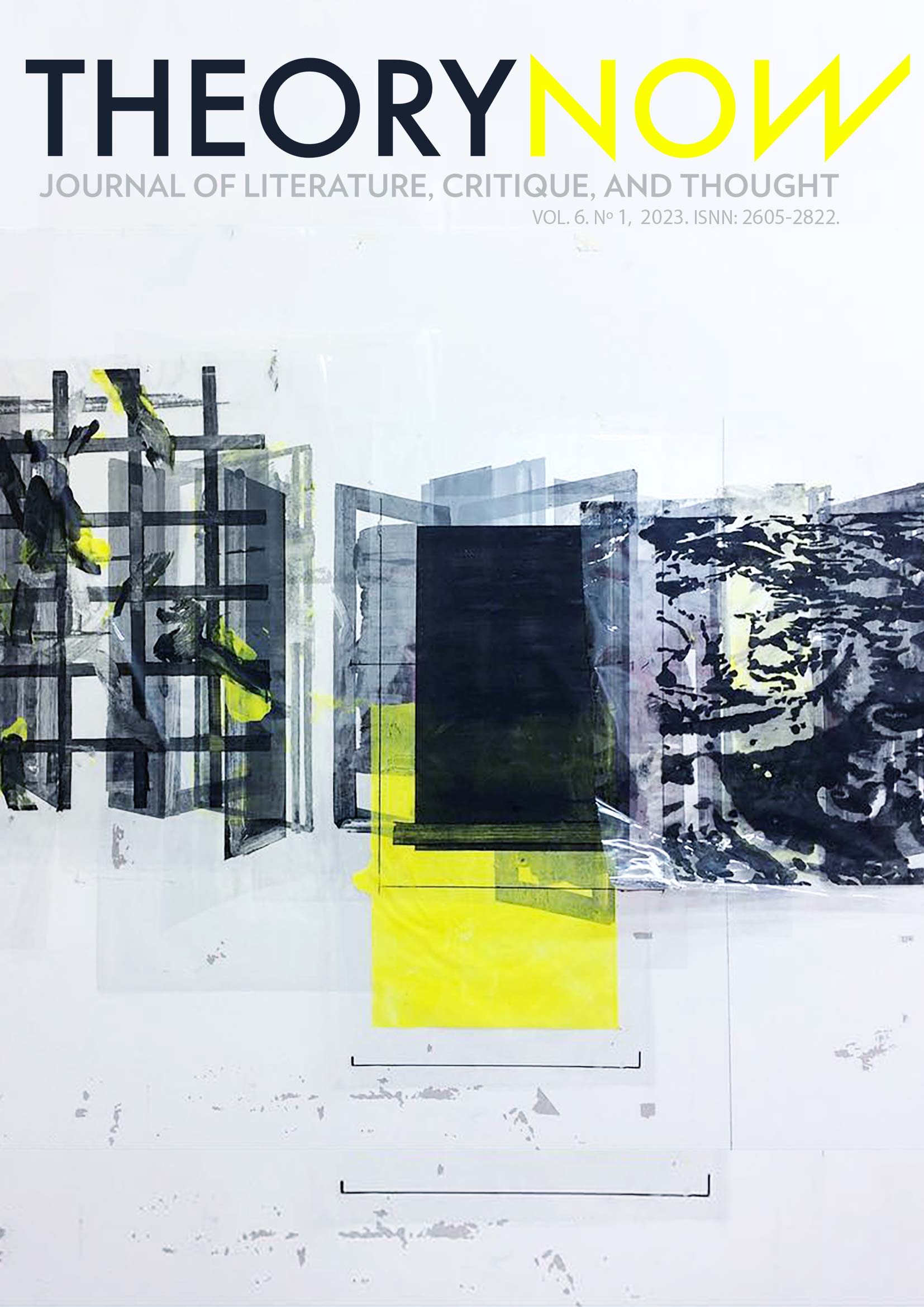Les pulsions sémiotiques de la poésie de Dickinson et leurs vertus médicinales
DOI :
https://doi.org/10.30827/tn.v6i1.26012Mots-clés :
Julia Kristeva, Emily Dickinson, Death, Genotext, Semiotic, Abject, Disability, Democracy of ProximityRésumé
The central thesis of this essay is that Dickinson’s work has significant implications for a critical medical humanities open to the interface between language and embodiment. We show that by employing what Kristeva would refer to as a highly effective and aesthetically potent genotextuality, Dickinson manages to transmit pain and grief. She thereby enables a process of de-insulation and sharing, which can have therapeutic effects on the reader/listener. Here, suffering is not refined into erudition, beauty or even nothingness as a result of denial. Dickinson, we argue, becomes one of Kristeva’s poet-surgeons of abjection, a poetess who cultivated not only a loyalty to malaise, but also a loyalty to overcoming the inability to share that malaise. The means by which Dickinson accomplishes this effect, we demonstrate, is via the semiotic pulsions of her language that have the potential to facilitate the establishment of a democracy of proximity, one that resonates with the deepest levels of human experience.
Téléchargements
Références
Aiken, Conrad. “Emily Dickinson”. Emily Dickinson: A Collection of Critical Essays, edited by Richard B. Sewall, Englewood Cliffs, N.J., Prentice-Hall, Inc., 1963, pp. 9-15.
Bedient, Calvin. “Kristeva and Poetry as Shattered Signification”. Critical Inquiry, vol. 16, no. 4, 1990, pp. 807-829.
Bloom, Harold. Modern Critical Views: Emily Dickinson. New York, Chelsea House, 1985. Cody, John. After Great Pain: The Inner Life of Emily Dickinson. Cambridge, Mass., Belknam Press, 1971.
Davidson, Michael. Invalid Modernism: Disability and the Missing Body of the Aesthetic. Oxford, Oxford University Press, 2019.
Delchamps, Vivian. “‘The Names of Sickness’: Emily Dickinson, Diagnostic Reading, and Articulating Disability”. The Emily Dickinson Journal, vol. 28, no. 2, 2019, pp. 106-132.
Deppman, Jep. Trying to Think with Emily Dickinson. Amherst, University of Massachusetts Press, 2008.
Dickinson, Emily. The Poems of Emily Dickinson, edited by R. W. Franklin, Cambridge, Mass., Harvard University Press, 2005.
Falk, Marcia. “Poem 1581: Kinds of Difficulty in ‘The farthest thunder that I heard’”. Emily Dickinson: A Celebration for Readers, edited by Suzanne Juhasz and Cristanne Miller, New York, Gordon and Breach, 1989, pp. 151-154.
Garbowsky, Maryanne. The House Without the Door: A Study of Emily Dickinson and the Illness of Agoraphobia. New Jersey, Fairleigh Dickinson University Press, 1989.
Habegger, Alfred. My Wars Are Laid Away in Books: The Life of Emily Dickinson. New York, Random House, 2001.
Jensen, Beth. “Creative Tension: The Symbolic and the Semiotic in Emily Dickinson’s ‘I heard a Fly buzz—when I died—”’. Women’s Literary Creativity and the Female Body, edited by Diane Long Hoeveler and Donna Decker Schuster, New York, Palgrave, 2007, pp. 23-42.
Katz, Adam. “Deconstructing Dickinson’s Dharma”. The Emily Dickinson Journal, vol. 22, no. 2, 2013, pp. 46-64.
Kristeva, Julia. An Essay on Abjection, translated by Leon Rudiez, New York, Columbia University Press, 1982.
____. Revolution in Poetic Language, translated by Margaret Waller, New York, Columbia University Press, 1984.
____. The Kristeva Reader, edited by Toril Moi, New York, Columbia University Press, 1986.
____. Hatred and Forgiveness, translated by Jeanine Herman, New York, Columbia University Press, 2010.
MacKenzie, Cindy and Barbara Dana, editors. Wider than the Sky: Essays and Meditations on the Healing Power of Emily Dickinson. Kent, OH, Kent State University Press, 2007.
Miller, Paul Allen. Diotima at the Barricades: French Feminists Read Plato. Oxford, Oxford University Press, 2016.
Mueller, Janel. The Native Tongue and the Word: Developments in English Prose Style 1380-1580. Chicago, University of Chicago Press, 1984.
Noble, Marianne. “Emily Dickinson in Love (With Death)”. The Cambridge Companion to Erotic Literature, edited by Bradford K. Mudge, Cambridge, Cambridge University Press, 2017, pp. 155-174.
Schauffler, Henry Park. “Suggestions from the Poems of Emily Dickinson (1891)”. Emily Dickinson’s Reception in the 1890s: A Documentary History, edited by Willis J. Buckingham, Pittsburgh, University of Pittsburgh Press, 1989, pp. 149-151.
Sewall, B. Richard. The Life of Emily Dickinson. Cambridge, Mass., Harvard University Press, 1998.
Sharpe, Matthew and Joanne Faulkner. Understanding Psychoanalysis. London and New York, Routledge, 2008.
Sielke, Sabine. Fashioning the Female Subject: The Intertextual Networking of Dickin- son, Moore, and Rich. Ann Arbor, University of Michigan Press, 1997.
Smith, Jadwiga and Anna Kapusta. Writing Life: Suffering as a Poetic Strategy of Emily Dickinson. Cracow, Jagiellonian University Press, 2011.
Sorby, Angela. “‘A Dimple in the Tomb’: Cuteness in Emily Dickinson”. ESQ: A Journal of Nineteenth-Century American Literature and Culture, vol. 63, no. 2, 2017, pp. 297-328.
Sreedharan, Chitra. Paradoxes in Selected Poetry of Emily Dickinson and Sylvia Plath. Newcastle upon Tyne, Cambridge Scholars Publishing, 2022.
Taggard, Genevieve. The Life and Mind of Emily Dickinson. New York, Knopf, 1930.
Wells, W. Henry. Introduction to Emily Dickinson. New York, Hendricks House, 1959.
Wilbur, Richard. “Sumptuous Destitution”. Emily Dickinson A Collection of Critical Essays, edited by Richard Sewall, Englewood Cliffs, N.J., Prentice-Hall, 1963, pp. 127-136.
Wolosky, Shira. “Emily Dickinson: Being in the Body”. The Cambridge Companion to Emily Dickinson, edited by Wendy Martin, Cambridge, Cambridge University Press, 2002, pp. 129-141.
Téléchargements
Publié-e
Comment citer
Numéro
Rubrique
Licence
Theory Now Journal of Literature, Critique, and Thought est une publication d’accès ouvert, immédiat et totalement gratuit pour les lecteurs autant que les auteurs. Les auteurs ne payent aucun frais pour le processus éditorial de leurs articles. Nous permettons la lecture, le téléchargement, la copie, la distribution, l’impression, la recherche, le lien ou la réutilisation de tous les travaux publiés à des fins non commerciales, à condition que l’auteur, la revue et l’entité éditoriale soient cités. La diffusion des articles dans les réseaux sociaux (Facebook, Twitter, LinkedIn, etc.) et scientifiques (ResearchGate, Academia.edu, etc.), les dépôts institutionnels universitaires et autres dépôts publics, blogs et web personnels ou institutionnels, Google Scholar, ORCID, ResearchID, ScopusID, etc., est vivement recommandée. Dans tous les cas, la propriété intellectuelle des articles et les possibles droits économiques dérivés d’eux sont conservés exclusivement par leurs auteurs.













